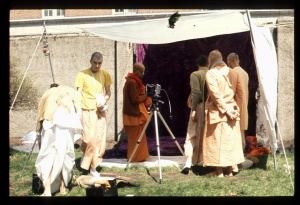CC Madhya 10.67: Difference between revisions
m (1 revision(s)) |
No edit summary |
||
| Line 1: | Line 1: | ||
{{ | [[Category:Sri Caitanya-caritamrta - Madhya-lila Chapter 10|C067]] | ||
<div style="float:left">'''[[Sri Caitanya-caritamrta|Śrī Caitanya-caritāmṛta]] - [[CC Madhya|Madhya-līlā]] - [[CC Madhya 10|Chapter 10: The Lord's Return to Jagannātha Purī]]'''</div> | |||
<div style="float:right">[[File:Go-previous.png|link=CC Madhya 10.66|Madhya-līlā 10.66]] '''[[CC Madhya 10.66|Madhya-līlā 10.66]] - [[CC Madhya 10.68|Madhya-līlā 10.68]]''' [[File:Go-next.png|link=CC Madhya 10.68|Madhya-līlā 10.68]]</div> | |||
{{CompareVersions|CC|Madhya 10.67|CC 1975|CC 1996}} | |||
{{RandomImage}} | |||
==== TEXT 67 ==== | ==== TEXT 67 ==== | ||
<div | <div class="verse"> | ||
nityānanda, jagadānanda, mukunda, dāmodara | :nityānanda, jagadānanda, mukunda, dāmodara | ||
cāri-jane yukti tabe karilā antara | :cāri-jane yukti tabe karilā antara | ||
</div> | </div> | ||
| Line 12: | Line 16: | ||
==== SYNONYMS ==== | ==== SYNONYMS ==== | ||
<div | <div class="synonyms"> | ||
''nityānanda''—Lord Nityānanda Prabhu; ''jagadānanda''—Jagadānanda; ''mukunda''—Mukunda; ''dāmodara''—Dāmodara; ''cāri-jane''—four persons; ''yukti''—plan; ''tabe''—thereupon; ''karilā''—did; ''antara''—within the mind. | |||
</div> | </div> | ||
| Line 19: | Line 23: | ||
==== TRANSLATION ==== | ==== TRANSLATION ==== | ||
<div | <div class="translation"> | ||
After this, the other devotees—headed by Nityānanda Prabhu, Jagadānanda, Mukunda and Dāmodara—began to consider a certain plan. | After this, the other devotees—headed by Nityānanda Prabhu, Jagadānanda, Mukunda and Dāmodara—began to consider a certain plan. | ||
</div> | </div> | ||
| Line 26: | Line 30: | ||
==== PURPORT ==== | ==== PURPORT ==== | ||
<div | <div class="purport"> | ||
Even though a person is rejected by the Supreme Personality of Godhead, the devotees of the Lord do not reject him; therefore the Lord’s devotees are more merciful than the Lord Himself. Śrīla Narottama dāsa Ṭhākura thus sings, chāḍiyā vaiṣṇava-sevā nistāra peyeche kebā: one cannot be relieved from the material clutches without engaging in the service of pure devotees. The Lord Himself may sometimes be very hard, but the devotees are always kind. Thus Kālā Kṛṣṇadāsa received the mercy of the four devotees mentioned above. | Even though a person is rejected by the Supreme Personality of Godhead, the devotees of the Lord do not reject him; therefore the Lord’s devotees are more merciful than the Lord Himself. Śrīla Narottama dāsa Ṭhākura thus sings, ''chāḍiyā vaiṣṇava-sevā nistāra peyeche kebā:'' one cannot be relieved from the material clutches without engaging in the service of pure devotees. The Lord Himself may sometimes be very hard, but the devotees are always kind. Thus Kālā Kṛṣṇadāsa received the mercy of the four devotees mentioned above. | ||
</div> | </div> | ||
__NOTOC__ | |||
<div style="float:right; clear:both;">[[File:Go-previous.png|link=CC Madhya 10.66|Madhya-līlā 10.66]] '''[[CC Madhya 10.66|Madhya-līlā 10.66]] - [[CC Madhya 10.68|Madhya-līlā 10.68]]''' [[File:Go-next.png|link=CC Madhya 10.68|Madhya-līlā 10.68]]</div> | |||
__NOTOC__ | |||
__NOEDITSECTION__ | |||
Revision as of 11:43, 30 July 2021

A.C. Bhaktivedanta Swami Prabhupada
TEXT 67
- nityānanda, jagadānanda, mukunda, dāmodara
- cāri-jane yukti tabe karilā antara
SYNONYMS
nityānanda—Lord Nityānanda Prabhu; jagadānanda—Jagadānanda; mukunda—Mukunda; dāmodara—Dāmodara; cāri-jane—four persons; yukti—plan; tabe—thereupon; karilā—did; antara—within the mind.
TRANSLATION
After this, the other devotees—headed by Nityānanda Prabhu, Jagadānanda, Mukunda and Dāmodara—began to consider a certain plan.
PURPORT
Even though a person is rejected by the Supreme Personality of Godhead, the devotees of the Lord do not reject him; therefore the Lord’s devotees are more merciful than the Lord Himself. Śrīla Narottama dāsa Ṭhākura thus sings, chāḍiyā vaiṣṇava-sevā nistāra peyeche kebā: one cannot be relieved from the material clutches without engaging in the service of pure devotees. The Lord Himself may sometimes be very hard, but the devotees are always kind. Thus Kālā Kṛṣṇadāsa received the mercy of the four devotees mentioned above.